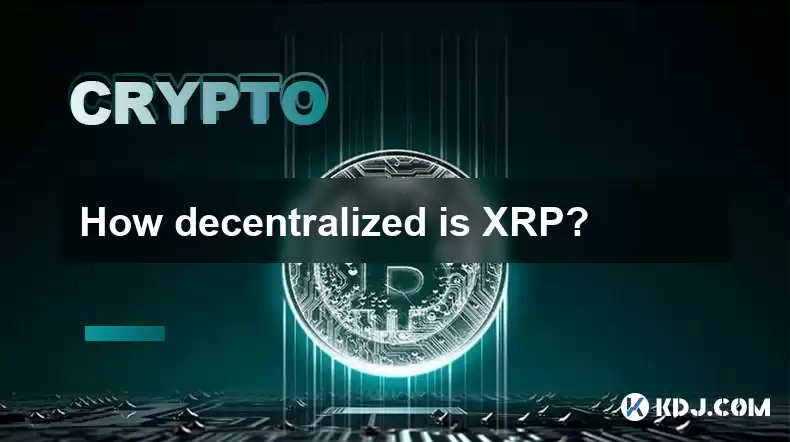-
 Bitcoin
Bitcoin $112400
-1.07% -
 Ethereum
Ethereum $3409
-3.27% -
 XRP
XRP $2.784
-6.60% -
 Tether USDt
Tether USDt $0.9997
-0.03% -
 BNB
BNB $739.3
-2.09% -
 Solana
Solana $158.0
-2.90% -
 USDC
USDC $0.9998
-0.02% -
 TRON
TRON $0.3213
-0.94% -
 Dogecoin
Dogecoin $0.1929
-5.01% -
 Cardano
Cardano $0.6974
-2.82% -
 Hyperliquid
Hyperliquid $36.69
-2.31% -
 Sui
Sui $3.327
-4.80% -
 Stellar
Stellar $0.3672
-5.18% -
 Chainlink
Chainlink $15.65
-3.07% -
 Bitcoin Cash
Bitcoin Cash $525.0
-1.68% -
 Hedera
Hedera $0.2291
-6.00% -
 Avalanche
Avalanche $20.91
-2.96% -
 Ethena USDe
Ethena USDe $1.000
0.00% -
 Toncoin
Toncoin $3.520
-1.12% -
 UNUS SED LEO
UNUS SED LEO $8.968
0.14% -
 Litecoin
Litecoin $105.7
0.26% -
 Shiba Inu
Shiba Inu $0.00001181
-1.79% -
 Polkadot
Polkadot $3.492
-2.08% -
 Uniswap
Uniswap $8.800
-3.10% -
 Dai
Dai $0.9999
-0.01% -
 Monero
Monero $289.9
-3.17% -
 Bitget Token
Bitget Token $4.243
-1.27% -
 Pepe
Pepe $0.00001006
-3.67% -
 Cronos
Cronos $0.1248
-5.68% -
 Aave
Aave $249.7
-2.50%
How decentralized is XRP?
XRP's decentralization is debated, with Ripple's significant XRP holdings and validator selection process raising concerns. While more decentralized than many projects, it falls short of Bitcoin's model, prompting ongoing efforts to improve its distribution and community governance.
Mar 05, 2025 at 10:24 pm

Key Points:
- XRP's decentralization is a complex and debated topic within the cryptocurrency community.
- Ripple Labs, the company behind XRP, holds a significant portion of XRP, raising concerns about its control over the network.
- The XRP Ledger's consensus mechanism, while distributed, relies on validators chosen by a relatively small group.
- The level of decentralization is less than some other cryptocurrencies like Bitcoin but more than many centralized projects.
- Ongoing discussions and developments aim to improve XRP's decentralization.
How Decentralized is XRP?
The question of XRP's decentralization is a central point of contention in the cryptocurrency world. Unlike Bitcoin, which boasts a highly distributed network with no single entity controlling a significant portion of its coins, XRP's situation is more nuanced. Ripple Labs, the company that created XRP and the XRP Ledger, initially held a substantial amount of XRP, leading to concerns about its potential influence and control over the network. While Ripple has been releasing XRP over time, the substantial initial allocation remains a point of discussion regarding its true decentralization.
The XRP Ledger operates on a unique consensus mechanism. It uses a system of validators who confirm transactions. These validators are not selected through a completely decentralized process like Proof-of-Work or even Proof-of-Stake in some networks. While numerous validators exist, their selection process and the concentration of validator power are factors that influence the perception of the network's decentralization. This system, while distributed, is not as robustly decentralized as some other cryptocurrencies.
The degree of decentralization also hinges on the network effect. While many validators participate, the overall level of participation and distribution among these validators remains a subject of ongoing debate. A more decentralized system would feature a more evenly distributed validator network, reducing the risk of any single entity or group exercising undue influence. The current system, while not fully centralized, falls short of the ideal decentralized model exhibited by some other cryptocurrencies.
Another factor impacting XRP's decentralization is the governance model. While the XRP Ledger is open-source, the degree of community influence on its development and direction is a subject of ongoing discussion. A truly decentralized system would ideally involve a more robust and participatory governance structure with broad community input and influence. Currently, Ripple Labs maintains a significant role in the XRP Ledger's ecosystem, influencing development and direction to a greater extent than in some other, more decentralized cryptocurrencies.
The future of XRP's decentralization is uncertain. Ripple Labs' continued involvement and the current validator selection process remain points of concern for those advocating for greater decentralization. However, ongoing community discussions and potential changes to the validator selection mechanism and governance structure could lead to a more decentralized future for the XRP Ledger. The current situation is a work in progress, and whether it can truly achieve a level of decentralization comparable to Bitcoin remains to be seen.
How does XRP's decentralization compare to other cryptocurrencies?
XRP's decentralization level is significantly different from other cryptocurrencies. Bitcoin, for example, is often cited as a highly decentralized cryptocurrency due to its Proof-of-Work consensus mechanism and widely distributed network of miners. Ethereum, with its Proof-of-Stake mechanism, also demonstrates a high level of decentralization, though potentially less than Bitcoin. In contrast, XRP's centralized validator selection process and Ripple's initial control over a substantial portion of XRP tokens present a less decentralized model. The level of decentralization falls somewhere between highly centralized projects and truly decentralized ones.
What are the benefits and drawbacks of XRP's current level of decentralization?
The current level of decentralization offers benefits like potentially faster transaction speeds and lower fees due to a more streamlined consensus mechanism. However, this comes at the cost of potentially reduced resilience to censorship and attacks. A truly decentralized system, while potentially slower and more expensive, is more resistant to single points of failure or control. The balance between speed/efficiency and resilience is a key consideration when evaluating XRP's decentralization.
What steps could be taken to increase XRP's decentralization?
Several steps could be considered to increase XRP's decentralization:
- More Distributed Validator Selection: Implementing a more decentralized validator selection process, perhaps involving community voting or a more distributed random selection mechanism.
- Increased Community Governance: Enhancing community participation in decision-making regarding the XRP Ledger's development and governance.
- Further XRP Distribution: Continuing to release Ripple's holdings of XRP in a controlled and transparent manner.
- Improved Transparency: Increasing the transparency of Ripple's involvement in the XRP Ledger and its operations.
Common Questions and Answers:
Q: Does Ripple control XRP? A: While Ripple Labs initially held a large amount of XRP, they have been releasing it over time. However, their significant past holdings and continued involvement in the XRP Ledger raise concerns about their influence. The level of control is a complex issue and a subject of ongoing debate.
Q: Is XRP centralized or decentralized? A: XRP's decentralization is a matter of ongoing debate. While the XRP Ledger uses a distributed consensus mechanism, Ripple's past and present influence and the validator selection process make it less decentralized than some other cryptocurrencies. It sits somewhere between fully centralized and fully decentralized.
Q: How does XRP's decentralization affect its security? A: A less decentralized system, like XRP's, could be more vulnerable to attacks or censorship compared to highly decentralized systems. The concentration of power among a smaller group of validators introduces a potential point of vulnerability.
Q: What is the future of XRP's decentralization? A: The future of XRP's decentralization depends on several factors, including Ripple's actions, community involvement, and potential changes to the validator selection process and governance structure. Whether it will become more decentralized remains to be seen.
Disclaimer:info@kdj.com
The information provided is not trading advice. kdj.com does not assume any responsibility for any investments made based on the information provided in this article. Cryptocurrencies are highly volatile and it is highly recommended that you invest with caution after thorough research!
If you believe that the content used on this website infringes your copyright, please contact us immediately (info@kdj.com) and we will delete it promptly.
- BlockDAG, SEI, Ethena: Top Crypto Performers Under the Microscope
- 2025-08-03 10:50:16
- Bitcoin Blasts Past $119K: How Institutional Adoption and Macro Shifts Fuel the Fire
- 2025-08-03 10:55:16
- Crypto, Grok, and August: Decoding the Latest Trends and Insights
- 2025-08-03 11:10:16
- Crypto, Phishing, and Your Wallet: A New Yorker's Guide to Staying Safe
- 2025-08-03 10:30:16
- Troller Cat Meme Coin Presale Soars: A New King in the Crypto Jungle?
- 2025-08-03 10:30:16
- Grayscale, Altcoin Trust, and Mid-Cap Mania: What's the Deal?
- 2025-08-03 08:50:16
Related knowledge

What is Chainlink (LINK)?
Jul 22,2025 at 02:14am
Understanding Chainlink (LINK): The Decentralized Oracle NetworkChainlink is a decentralized oracle network designed to bridge the gap between blockch...

What is Avalanche (AVAX)?
Jul 22,2025 at 08:35am
What is Avalanche (AVAX)?Avalanche (AVAX) is a decentralized, open-source blockchain platform designed to support high-performance decentralized appli...

What is Polkadot (DOT)?
Jul 19,2025 at 06:35pm
Understanding the Basics of Polkadot (DOT)Polkadot (DOT) is a multi-chain network protocol designed to enable different blockchains to transfer messag...

What is Litecoin (LTC)?
Jul 23,2025 at 11:35am
Overview of Litecoin (LTC)Litecoin (LTC) is a peer-to-peer cryptocurrency that was created in 2011 by Charlie Lee, a former Google engineer. It is oft...

What is Monero (XMR)?
Jul 21,2025 at 10:07am
What is Monero (XMR)?Monero (XMR) is a decentralized cryptocurrency designed to provide enhanced privacy and anonymity for its users. Unlike Bitcoin a...

How to add indicators to Ethereum chart on TradingView?
Jul 19,2025 at 07:15am
What Is an Ethereum Chart on TradingView?The Ethereum chart on TradingView is a visual representation of the price movement of Ethereum (ETH) over a s...

What is Chainlink (LINK)?
Jul 22,2025 at 02:14am
Understanding Chainlink (LINK): The Decentralized Oracle NetworkChainlink is a decentralized oracle network designed to bridge the gap between blockch...

What is Avalanche (AVAX)?
Jul 22,2025 at 08:35am
What is Avalanche (AVAX)?Avalanche (AVAX) is a decentralized, open-source blockchain platform designed to support high-performance decentralized appli...

What is Polkadot (DOT)?
Jul 19,2025 at 06:35pm
Understanding the Basics of Polkadot (DOT)Polkadot (DOT) is a multi-chain network protocol designed to enable different blockchains to transfer messag...

What is Litecoin (LTC)?
Jul 23,2025 at 11:35am
Overview of Litecoin (LTC)Litecoin (LTC) is a peer-to-peer cryptocurrency that was created in 2011 by Charlie Lee, a former Google engineer. It is oft...

What is Monero (XMR)?
Jul 21,2025 at 10:07am
What is Monero (XMR)?Monero (XMR) is a decentralized cryptocurrency designed to provide enhanced privacy and anonymity for its users. Unlike Bitcoin a...

How to add indicators to Ethereum chart on TradingView?
Jul 19,2025 at 07:15am
What Is an Ethereum Chart on TradingView?The Ethereum chart on TradingView is a visual representation of the price movement of Ethereum (ETH) over a s...
See all articles

























































































